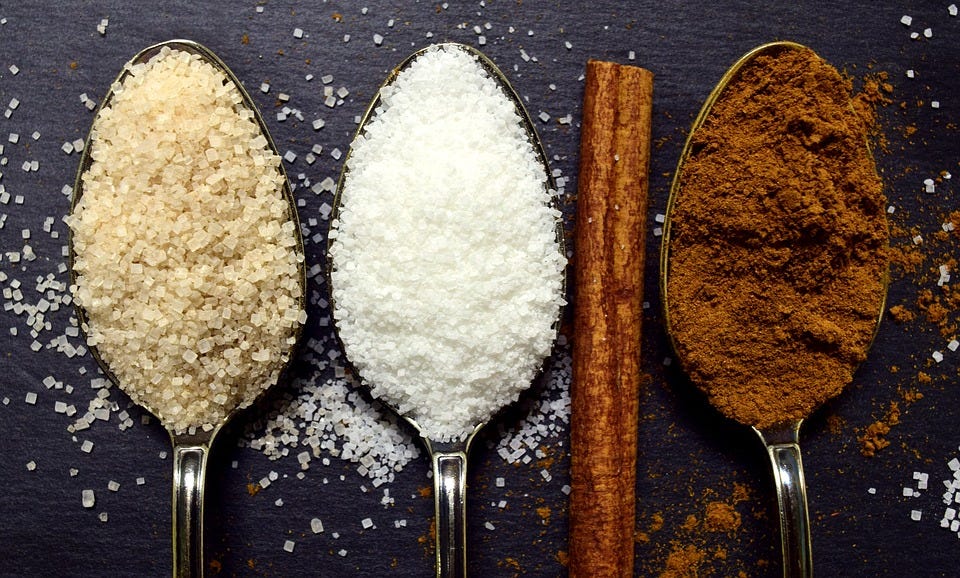Do You Have A 1000 Teaspoon Sugar Habit?
Like it or not, few get through the day without adding some sort of sweetener to the daily food intake. We are a society made of sugar, aspartame and syrup addicts, drawn irresistibly to the taste of sweetness. Many simply do not know how much sugar they consume, neither do they understand the total health repercussions of sugar. So allow me to give a quick breakdown here to spur you into eliminating this poison from your diet.
Why is sugar bad for you?
To begin eliminating anything from our diet, we have to understand why it’s bad. Whether we add it to our food or manufacturers do, studies show conclusively that it is one the greatest threats to human health. And unless we wise up, we’re not only going to keep getting more rotund and sick, but we’re also going to keep straining at the seams of an already bloated health care system.
Dr. Robert Lustig, Professor of Pediatrics in the Division of Endocrinology at the University of California, San Francisco, is one of the leading experts on childhood obesity, and has been a pioneer in decoding sugar metabolism. He says that instead of helping to satisfy our hunger us, many studies point to the fact that fructose may fool our brain into thinking we are not full, so we overeat. But there’s more. Eat too much of this excess “energy” and it fails to convert into energy by the mitochondria inside our cells, turning instead into excess liver fat.
According to the NYT, Dr. Lustig’s view of fructose is not based on excess calories, but that of a poison:
“If Lustig is right, then our excessive consumption of sugar is the primary reason that the numbers of obese and diabetic Americans have skyrocketed in the past 30 years. But his argument implies more than that. If Lustig is right, it would mean that sugar is also the likely dietary cause of several other chronic ailments widely considered to be diseases of Western lifestyles — heart disease, hypertension and many common cancers among them.”
Processed sugars especially have additional fructose added to them by the food industry (especially high fructose corn syrup (HFCS), because they’re cheap and make foods taste better. This is important for low-calorie foods which would taste somewhat like chewing cardboard without them. That’s also why I always counsel people not to look at calorie content alone. A low-calorie soup may have added glucose-fructose, totally defeating the purpose for which is eaten.
How much sugar do we consume?
Each week the average person consumes roughly 240-250 teaspoons of sugar from various sources. That’s about 1000 teaspoons per month folks. Some argue that they can only account for a few teaspoons a day, but they are fooled by hidden sources. Remember, a pop, or slurpee holds about 12-15 teaspoons of sugar itself. If you have two of those daily, a bowl of sweetened cereal, two coffees with sugar, perhaps a chocolate bar and your usual hidden sugars in meals, breads, etc, you easily account for this total weekly consumption. If still an unbeliever, look down at the ever-expanding belly or hips to prove the point.
Drop sugar, lose weight?
It’s no longer safe to say that we can eat sugar in moderate amounts and still be healthy. This implies that we are both in control of how many refined foods we eat and that we understand all hidden sources of sweeteners. Both assumptions can be safely be thrown out the window with most people. Refined foods are here to stay and the masses are hooked. And fructose is so cheap it is used in virtually all processed foods. So the average person is consuming about 150 grams of sugar daily, half of which is fructose or 300 percent more than the amount that will trigger biochemical health problems. Add that to the fact that many consume more than twice that amount.
To lose weight, your best bet is to completely cut out any known sugar sources and then eat as healthy as possible, without added refined foods in cans, boxes or junk foods. Also eliminate fruit juices and pop because they’re crammed full of this poison! These drinks contribute more to obesity than anything else, especially in our children.
You’ll find this step will start you immediately losing weight – without adjusting anything else about how you live. However, your sense of addiction will take a little longer to go. At the two- four week mark you may notice you are no having difficulties bypassing foods you formerly craved.
So if you’re serious about your health and your weight, try what this article implies. Give it a good effort, not some shallow resolution. The quality and quantity of your life literally depends on it.
Sources:
1. Canadian Sugar institute
2. American Heart Association
3. World Health Organization
4. NY Times
5. Giveupsugar.com
6. “Sugar: The Bitter Truth” (Robert Lustig) – posted on YouTube
7. Fat Chance: Beating the Odds against Sugar, Processed Food, Obesity, and Disease. New York: Hudson Street Press, 2013.
8. Is Sugar Toxic – Gary Taubes, New York Times, April 13, 2011 .
9. Elliott SS, Keim NL, Stern JS, Teff K, Havel PJ (2002). “Fructose, weight gain and the insuline resistance syndrome”. Am J Clin Nutr 76 (5): 911–22.
10. White JS (2008). “Straight talk about high-fructose corn syrup: what it is and what it ain’t”. Am J Clin Nutr (Am Soc Clin Nutr) 57 (18): 8125–9.





